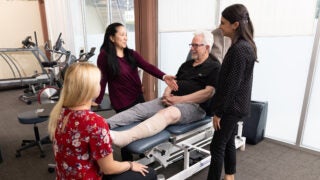To boost Latino participation in Alzheimer’s studies, don’t skimp on ‘personalismo,’ USC researcher says
Latinos represent only a small fraction of people enrolled in Alzheimer’s-related clinical trials. USC researcher María Aranda has some ideas on how to fix that.
Latinos make up 19% of the U.S. population, yet they represent only a small fraction of people enrolled in clinical trials for Alzheimer’s treatment. USC researcher María Aranda has recommendations for fixing that.
? Listen to our chat with María Aranda, a professor at the USC Suzanne Dworak-Peck School of Social Work, on USC’s Ideas in Action podcast.
? Read the Alzheimer’s Association story about Aranda’s new study.
“There has been too much onus, even blame, put on Latino individuals and families. But when researchers ignore micro-level details, it results in macro-level exclusion of Latinos from clinical trials,” said Aranda, who is the director of the outreach, recruitment and engagement core of the Alzheimer’s Disease Research Center at USC. “For example, Latinos’ expectation of personalismo — the quality and trustworthiness of interpersonal interactions — can be thwarted when providers’ (and by extension researchers’) time with them in the care visit or encounter is brief or hurried.”
Latinos and Alzheimer’s research: Addressing underrepresentation
To address the issue of underrepresentation of U.S. Latinos in Alzheimer’s research, Aranda and her co-authors have issued an urgent call to the research community to address this problem. Their study, just out in Alzheimer’s & Dementia: Translational Research & Clinical Interventions, outlines key steps:
- Embed recruitment and research operations within Latino communities and settings.
- Creatively address limited literacy in English and Spanish.
- Make binding all diversity plans at the Food and Drug Administration for AD/ADRD (Alzheimer’s disease and Alzheimer’s disease-related dementias) clinical trials.
- Support national legislation promoting trial participation of underrepresented groups.
“Closing the racial and ethnic disparity gap in Alzheimer’s and Alzheimer’s-related dementia trials,” Aranda said, “is clearly good science.”



